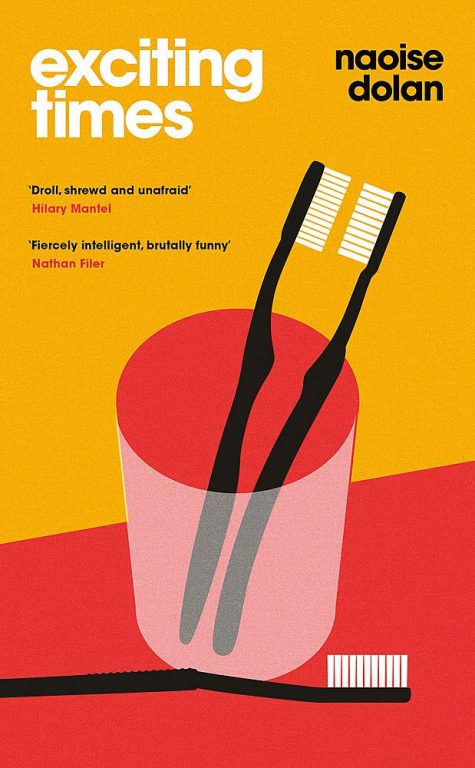My first novel, Exciting Times, began with the hooks under a standing table at a rooftop bar in Hong Kong. I was intrigued because it seemed sensible to give people somewhere to hang their bags, and yet I had not seen hooks like that in other cities like London. Quite possibly London bars do have table hooks and I’d just never spotted them. One reason I’m curious about trivialities is that I notice fewer of them than most people seem to, so whatever I do observe gains prominence in my mind. This tendency towards selective fixation provides me with teasing-space, although the cost is that I fluff social interactions and am chronically late.
Anyway, it was not really about the hooks. It was about choosing a speck or a jot, and then writing the rest of the scene so that it made sense for that detail to be there. Often when I edit later, the initial particle gets excised. Rereading Exciting Times now, I might come to the scene that started from the hooks and think of it as ‘the scene from the hooks’ – but in fact I cut those hooks quite a while back. They’re no longer there for readers to see.
This is how I write: inventing characters on the fly, improvising wildly, cutting whatever I don’t like whenever I decide I don’t like it. I start small and follow my curiosities. I can work in this way because I’ve read so many three-volume novels that the structure is already there in my brain. It’s like when I walk along roads I know well, stopping to photograph flowers. I feel I only see whatever my 50mm lens has magnified, but I still know where I’m going.
If something is usually done in novels, but I can’t actively justify doing it, then I don’t do it. This was how I approached the question of engaging my reader’s sympathy. I asked myself: do I want to convince the reader to like these characters? Is that a task that would interest or challenge me?
I wanted to be honest about the characters in Exciting Times, and so I decided I didn’t care whether anyone would side with them. In my view, Ava, the 22-year-old narrator, is by turns quiescent and actively self-destructive. Julian, avowedly not her boyfriend, is determined to see his emotional repression as a mark of superiority. Edith, Ava’s girlfriend, openly pursues happiness – but she pursues it with Ava, and to love a self-sabotager is itself a form of self-sabotage. None of the trio, then, has a cut-and-dried commitment to becoming a better person. To me, that’s fine. Not everyone is constantly trying to learn and grow, so why should they in a novel? I felt invested in the characters when I wrote them, and that was enough; I wanted to find out where they’d all end up, which was, to me, quite separate from whether I approved of their choices. Edith is my favourite, but that’s because she shares some of my better qualities. I didn’t write her aiming for this to be the case. Looking back over the book, I can just see that it’s true.
I wasn’t making a point by not having the characters vie for approval. I just didn’t feel like doing it. Not everything in a novel has to be both fun for the writer and useful for readers, but it ought to be at least one of the two. I don’t enjoy writing description, but it helps to set the scene, so I included that; not all of my dialogue is vital, but I love writing it, so I included that as well; but if I don’t want to write something and the story doesn’t need it, then my novel is better without it. If ‘unlikeability’ made the characters boring to me, then I would have viewed it as a problem, but I find it eminently possible to like people while finding them dull, and to dislike them while finding them interesting. I don’t like Becky Sharp, but I do love reading about her. Every major character I write is probably just Becky Sharp in a different skin.
The word ‘unlikeable’ has often come up in the novel’s reception so far. But ‘the characters are unlikeable’ says nothing of greater substance than: ‘I don’t like the characters’. Critics and readers tend to favour the former phrasing; we attribute to the culture our individual response. We often don’t know whether anyone else disliked the characters in a novel. If we do know that, it’s only because we’ve focus-grouped extensively enough to feel secure in our assessment – in which case, ‘the characters are unlikeable’ isn’t a review of a book, but of its reception. Why don’t we just say, ‘I don’t like the characters’? Why can’t we own our subjectivity?
Because I’m now being read and discussed and asked about my process, I’m sometimes tempted to gravitate away from working instinctively and towards methods that are easier to unpack in interviews. I sit down with elaborate plots in my head. But none of those ideas pan out. Their scale feels stodgily compendious to me, and I soon give up. The only way for me to produce anything that I care about, or want to finish, is by starting with tiny hooks that I can slowly uncoil.

Naoise Dolan’s novel Exciting Times is available now.
Image © Ferry Octavian







